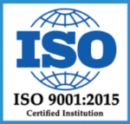Description
Course Name: Diploma in ISO Standards- Integrated Management System
Course Id: DISIMS/Q1001.
Eligibility: Completion of 10+2 (higher Secondary) or equivalent.
Objective: A Diploma in ISO Standards – Integrated Management System is a valuable qualification for professionals seeking to enhance their career in quality management, compliance, and operations. It equips individuals with the skills to improve organizational processes, ensure compliance with international standards, and drive efficiency and sustainability in businesses.
Duration: Six Months.






Debit/Credit Card, Wallet, Paytm, Net Banking, UPI, or Google Pay.



• A soft copy (scanned) of your certificate via email within 7 days of examination.
• A hard copy (original with official seal and signature) sent to your address within 45 day of declaration of result.

Online Examination Detail:
- Duration- 120 minutes.
- No. of Questions- 60. (Multiple Choice Questions).
- 10 Questions from each module, each carry 10 marks.
- Maximum Marks- 600, Passing Marks- 40%.
- There is no negative marking in this module.
| How Students will be Graded: | ||
| S.No. | Marks | Grade |
| 1 | 91-100 | O (Outstanding) |
| 2 | 81-90 | A+ (Excellent) |
| 3 | 71-80 | A (Very Good) |
| 4 | 61-70 | B (Good) |
| 5 | 51-60 | C (Average) |
| 6 | 41-50 | P (Pass) |
| 7 | 0-40 | F (Fail) |







Syllabus
Introduction to ISO Standards and Integrated Management Systems (IMS): Overview of ISO standards, Importance and benefits of an Integrated Management System (IMS), Key principles of ISO standards, History and evolution of ISO standards, Structure and framework of ISO, Understanding PDCA (Plan-Do-Check-Act) cycle, Risk-based thinking in ISO, Overview of ISO 9001, ISO 14001, and ISO 45001, Regulatory and legal requirements, Process approach in IMS.
ISO 9001 – Quality Management System (QMS): Introduction to ISO 9001, Principles of Quality Management, Requirements of ISO 9001:2015, Documentation and record-keeping, Leadership and organizational roles, Customer satisfaction and continuous improvement, Internal audits and compliance, Risk-based thinking in QMS, Corrective and preventive actions (CAPA), Case studies on QMS implementation.
ISO 14001 – Environmental Management System (EMS): Introduction to ISO 14001, Environmental aspects and impact assessment, Compliance with environmental laws and regulations, Lifecycle perspective in EMS, Environmental performance evaluation, Pollution prevention and waste management, Sustainable resource management, Emergency preparedness and response, Documentation and operational controls, Continuous improvement in EMS.
ISO 45001 – Occupational Health & Safety Management System (OHSMS): Overview of ISO 45001, Workplace hazard identification and risk assessment, Health and safety legal requirements, Worker participation and leadership in OHSMS, Emergency preparedness and response, Incident investigation and reporting, Occupational health programs, Monitoring and performance measurement, Role of safety culture in organizations, Integrating OHSMS with QMS and EMS.
ISO 27001 – Information Security Management System (ISMS): Introduction to ISO 27001, Information security policies and controls, Risk assessment and risk treatment in ISMS, Cybersecurity threats and data protection, Incident management and response, Business continuity planning, Legal and compliance requirements, Internal auditing in ISMS, Training and awareness in information security, Implementation challenges and solutions.
ISO 22000 – Food Safety Management System (FSMS): Overview of ISO 22000, Food safety hazards and risk assessment, Hazard Analysis and Critical Control Points (HACCP), Food safety regulations and compliance, Prerequisite programs (PRPs), Food safety documentation and record-keeping, Internal audits and corrective actions, Supplier management in FSMS, Customer communication and traceability, Continuous improvement in FSMS.
Job Opportunities after completion of Diploma in ISO Standards- Integrated Management System course:
Upon completing the Diploma in ISO Standards – Integrated Management System (IMS) program, graduates gain expertise in managing and implementing ISO standards like ISO 9001 (Quality Management), ISO 14001 (Environmental Management), and ISO 45001 (Occupational Health & Safety Management). These skills are highly valued in various industries aiming to maintain compliance, improve operational efficiency, and enhance workplace safety.
Career Options After Completing the Diploma in ISO Standards – IMS
1. Quality Assurance Manager
- Role: Oversee quality systems, ensure ISO compliance, and maintain standards for product and service quality.
- Salary Range: ₹5,00,000 – ₹12,00,000 per annum
2. ISO Consultant
- Role: Advise organizations on ISO certification processes and help implement integrated management systems.
- Salary Range: ₹6,00,000 – ₹15,00,000 per annum
3. Internal Auditor (ISO Standards)
- Role: Conduct internal audits to ensure adherence to ISO standards and suggest process improvements.
- Salary Range: ₹4,00,000 – ₹8,00,000 per annum
4. HSE (Health, Safety & Environment) Manager
- Role: Develop and implement ISO 45001-compliant safety management systems to ensure workplace safety.
- Salary Range: ₹6,00,000 – ₹14,00,000 per annum
5. Environmental Compliance Officer
- Role: Ensure the organization adheres to ISO 14001 standards and meets environmental regulations.
- Salary Range: ₹5,00,000 – ₹10,00,000 per annum
6. Operations Manager
- Role: Integrate ISO standards into operations for efficiency and regulatory compliance.
- Salary Range: ₹7,00,000 – ₹12,00,000 per annum
7. Documentation Specialist
- Role: Maintain records and documentation for ISO audits, certifications, and compliance reports.
- Salary Range: ₹3,50,000 – ₹6,00,000 per annum
8. Training Coordinator (ISO Standards)
- Role: Train employees on ISO processes, implementation, and compliance requirements.
- Salary Range: ₹4,00,000 – ₹7,00,000 per annum
9. Supplier Quality Engineer
- Role: Ensure suppliers meet ISO standards and quality requirements.
- Salary Range: ₹4,00,000 – ₹9,00,000 per annum
10. Lead Auditor (ISO Standards)
- Role: Conduct external audits for ISO certification and ensure compliance for clients.
- Salary Range: ₹8,00,000 – ₹18,00,000 per annum
Key Industries for Employment
- Manufacturing
- Healthcare
- IT & Software
- Construction
- Automotive
- Pharmaceuticals
- Energy & Utilities
Skills Acquired
- Implementation of ISO 9001, ISO 14001, ISO 45001
- Risk Assessment & Mitigation
- Compliance Auditing
- Process Optimization
- Documentation Management
Conclusion
Graduates can secure roles in quality management, compliance, and auditing, with entry-level salaries starting at ₹3,50,000 per annum and senior roles earning up to ₹18,00,000+ per annum. The demand for ISO-certified professionals is growing across industries focused on quality, safety, and sustainability.

